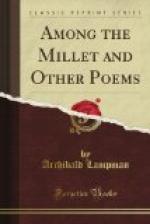And the weaver wove, and the good wife fled,
And the city was made a tomb,
And a flame that shook from the rocks overhead
Shone into that silent room,
And touched like a wide red kiss on the dead
Brown weaver slain by his loom.
Yet I think that in some dim shadowy land,
Where no suns rise or set,
Where the ghost of a whilom loom doth stand
Round the dusk of its silken net,
Forever flyeth his shadowy hand,
And the weaver is weaving yet.
THE THREE PILGRIMS
In days, when the fruit of men’s labour was
sparing,
And hearts were weary and nigh to break,
A sweet grave man with a beautiful bearing
Came to us once in the fields and spake.
He told us of Roma, the marvellous city,
And of One that came from the living God,
The Virgin’s Son, who in heavenly pity,
Bore for his people the rood and rod,
And how at Roma the gods were broken,
The new was strong, and the old nigh dead,
And love was more than a bare word spoken,
For the sick were healed and the poor
were fed;
And we sat mute at his feet, and hearkened:
The grave men came in an hour and went,
But a new light shone on a land long darkened;
The toil was weary, the fruit was spent:
So we came south, till we saw the city,
Speeding three of us, hand in hand,
Seeking peace and the bread of pity,
Journeying out of the Umbrian land;
Till we saw from the hills in a dazzled coma
Over the vines that the wind made shiver,
Tower on tower, the great city Roma,
Palace and temple, and winding river:
And we stood long in a dream and waited,
Watching and praying and purified,
And came at last to the walls belated,
Entering in at the eventide:
And many met us with song and dancing,
Mantled in skins and crowned with flowers,
Waving goblets and torches glancing,
Faces drunken, and grinned in ours:
And one, that ran in the midst, came near us—
“Crown yourselves for the feast,”
he said,
But we cried out, that the God might hear us,
“Where is Jesus, the living bread?”
And they took us each by the hand with laughter;
Their eyes were haggard and red with wine:
They haled us on, and we followed after,
“We will show you the new God’s
shrine.”
Ah, woe to out tongues, that, forever unsleeping,
Harp and uncover the old hot care,
The soothing ash from the embers sweeping,
Wherever the soles of our sad feet fare.
Ah, we were simple of mind, now knowing,
How dreadful the heart of a man might
be;
But the knowledge of evil is mighty of growing;
Only the deaf and the blind are free.
We came to a garden of beauty and pleasure—
It was not the way that our own feet choose—
Where a revel was whirling in many a measure,
And the myriad roar of a great crowd rose;




